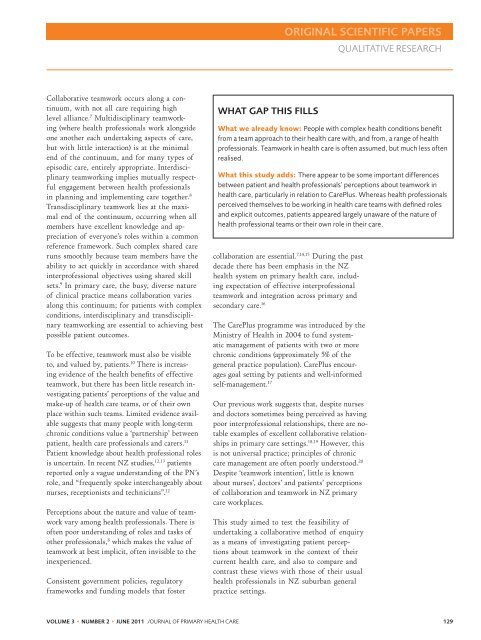single PDF of the entire issue - The Royal New Zealand College of ...
single PDF of the entire issue - The Royal New Zealand College of ...
single PDF of the entire issue - The Royal New Zealand College of ...
Create successful ePaper yourself
Turn your PDF publications into a flip-book with our unique Google optimized e-Paper software.
ORIGINAL SCIENTIFIC PAPErS<br />
quaLitative research<br />
Collaborative teamwork occurs along a continuum,<br />
with not all care requiring high<br />
level alliance. 7 Multidisciplinary teamworking<br />
(where health pr<strong>of</strong>essionals work alongside<br />
one ano<strong>the</strong>r each undertaking aspects <strong>of</strong> care,<br />
but with little interaction) is at <strong>the</strong> minimal<br />
end <strong>of</strong> <strong>the</strong> continuum, and for many types <strong>of</strong><br />
episodic care, <strong>entire</strong>ly appropriate. Interdisciplinary<br />
teamworking implies mutually respectful<br />
engagement between health pr<strong>of</strong>essionals<br />
in planning and implementing care toge<strong>the</strong>r. 8<br />
Transdisciplinary teamwork lies at <strong>the</strong> maximal<br />
end <strong>of</strong> <strong>the</strong> continuum, occurring when all<br />
members have excellent knowledge and appreciation<br />
<strong>of</strong> everyone’s roles within a common<br />
reference framework. Such complex shared care<br />
runs smoothly because team members have <strong>the</strong><br />
ability to act quickly in accordance with shared<br />
interpr<strong>of</strong>essional objectives using shared skill<br />
sets. 9 In primary care, <strong>the</strong> busy, diverse nature<br />
<strong>of</strong> clinical practice means collaboration varies<br />
along this continuum; for patients with complex<br />
conditions, interdisciplinary and transdisciplinary<br />
teamworking are essential to achieving best<br />
possible patient outcomes.<br />
To be effective, teamwork must also be visible<br />
to, and valued by, patients. 10 <strong>The</strong>re is increasing<br />
evidence <strong>of</strong> <strong>the</strong> health benefits <strong>of</strong> effective<br />
teamwork, but <strong>the</strong>re has been little research investigating<br />
patients’ perceptions <strong>of</strong> <strong>the</strong> value and<br />
make-up <strong>of</strong> health care teams, or <strong>of</strong> <strong>the</strong>ir own<br />
place within such teams. Limited evidence available<br />
suggests that many people with long-term<br />
chronic conditions value a ‘partnership’ between<br />
patient, health care pr<strong>of</strong>essionals and carers. 11<br />
Patient knowledge about health pr<strong>of</strong>essional roles<br />
is uncertain. In recent NZ studies, 12,13 patients<br />
reported only a vague understanding <strong>of</strong> <strong>the</strong> PN’s<br />
role, and “frequently spoke interchangeably about<br />
nurses, receptionists and technicians”. 12<br />
Perceptions about <strong>the</strong> nature and value <strong>of</strong> teamwork<br />
vary among health pr<strong>of</strong>essionals. <strong>The</strong>re is<br />
<strong>of</strong>ten poor understanding <strong>of</strong> roles and tasks <strong>of</strong><br />
o<strong>the</strong>r pr<strong>of</strong>essionals, 8 which makes <strong>the</strong> value <strong>of</strong><br />
teamwork at best implicit, <strong>of</strong>ten invisible to <strong>the</strong><br />
inexperienced.<br />
Consistent government policies, regulatory<br />
frameworks and funding models that foster<br />
WHAT GAP THIS FILLS<br />
What we already know: People with complex health conditions benefit<br />
from a team approach to <strong>the</strong>ir health care with, and from, a range <strong>of</strong> health<br />
pr<strong>of</strong>essionals. Teamwork in health care is <strong>of</strong>ten assumed, but much less <strong>of</strong>ten<br />
realised.<br />
What this study adds: <strong>The</strong>re appear to be some important differences<br />
between patient and health pr<strong>of</strong>essionals’ perceptions about teamwork in<br />
health care, particularly in relation to CarePlus. Whereas health pr<strong>of</strong>essionals<br />
perceived <strong>the</strong>mselves to be working in health care teams with defined roles<br />
and explicit outcomes, patients appeared largely unaware <strong>of</strong> <strong>the</strong> nature <strong>of</strong><br />
health pr<strong>of</strong>essional teams or <strong>the</strong>ir own role in <strong>the</strong>ir care.<br />
collaboration are essential. 7,14,15 During <strong>the</strong> past<br />
decade <strong>the</strong>re has been emphasis in <strong>the</strong> NZ<br />
health system on primary health care, including<br />
expectation <strong>of</strong> effective interpr<strong>of</strong>essional<br />
teamwork and integration across primary and<br />
secondary care. 16<br />
<strong>The</strong> CarePlus programme was introduced by <strong>the</strong><br />
Ministry <strong>of</strong> Health in 2004 to fund systematic<br />
management <strong>of</strong> patients with two or more<br />
chronic conditions (approximately 5% <strong>of</strong> <strong>the</strong><br />
general practice population). CarePlus encourages<br />
goal setting by patients and well-informed<br />
self-management. 17<br />
Our previous work suggests that, despite nurses<br />
and doctors sometimes being perceived as having<br />
poor interpr<strong>of</strong>essional relationships, <strong>the</strong>re are notable<br />
examples <strong>of</strong> excellent collaborative relationships<br />
in primary care settings. 18,19 However, this<br />
is not universal practice; principles <strong>of</strong> chronic<br />
care management are <strong>of</strong>ten poorly understood. 20<br />
Despite ‘teamwork intention’, little is known<br />
about nurses’, doctors’ and patients’ perceptions<br />
<strong>of</strong> collaboration and teamwork in NZ primary<br />
care workplaces.<br />
This study aimed to test <strong>the</strong> feasibility <strong>of</strong><br />
undertaking a collaborative method <strong>of</strong> enquiry<br />
as a means <strong>of</strong> investigating patient perceptions<br />
about teamwork in <strong>the</strong> context <strong>of</strong> <strong>the</strong>ir<br />
current health care, and also to compare and<br />
contrast <strong>the</strong>se views with those <strong>of</strong> <strong>the</strong>ir usual<br />
health pr<strong>of</strong>essionals in NZ suburban general<br />
practice settings.<br />
VOLUME 3 • NUMBER 2 • JUNE 2011 J OURNAL OF PRIMARY HEALTH CARE 129

















